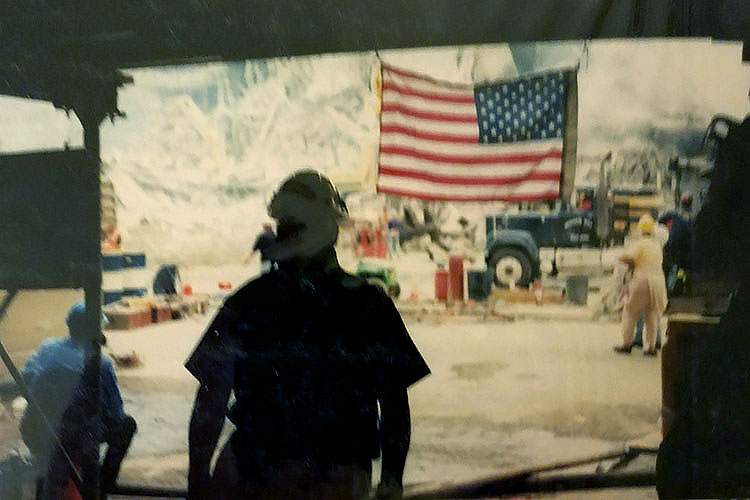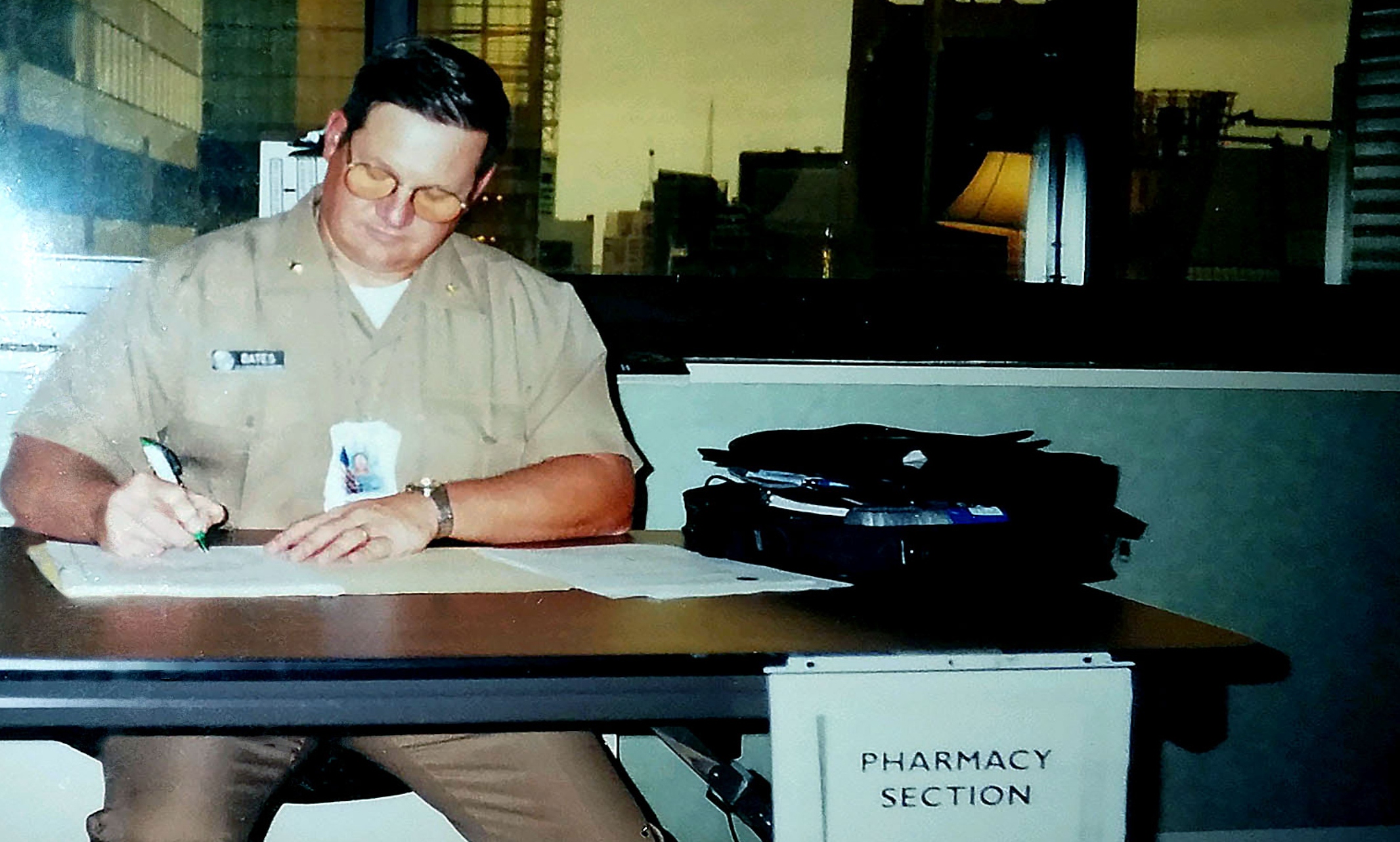Twenty years later, the horrifying events of 9/11 are etched in David Bates’ memory.
Bates (B.S./R.Ph. ’93) recently thumbed through a large scrapbook on a desk at his home in Gallup, New Mexico. As the UMKC School of Pharmacy alumnus reminisced about the role he played as lead pharmacist for the emergency response teams at Ground Zero during the early days of the recovery effort, he stopped and pulled out a sheet of paper.
“Look at this,” Bates said. “I still have a copy of my deployment orders.”
Then a member of the United States Public Health Service in Tsaile, Arizona, Bates was back at UMKC on a recruiting trip for the service when news broke that terrorists had struck in New York City.
“By the time I got to campus, things were getting strange,” he said.
Finally able to connect by phone with his superiors at the emergency response headquarters, Bates was told to immediately return home to Arizona and await further orders. A week later, when grounded flights were finally restored in the U.S., Bates received the order to report to New York. His assignment would be to requisition supplies and establish a pharmacy in support of the five treatment sites set up for response teams near Ground Zero.
“When I got there the pile was still carrying temperatures of 1,200 degrees in places and was still burning big time. All that stuff was still being released in the air. You didn’t know what you were breathing. The ash in the air was everywhere. When you looked and saw the debris fields, they were seven stories high. That was very hard for me." — David Bates
Two years earlier, as a member of a disaster response team based in Albuquerque, New Mexico, Bates had deployed to Fort Dix Army Base in New Jersey as part of Operation Provide Refuge. During that tour, he provided pharmaceutical care for refugees entering the United States from war-torn Kosovo.
“That was my big break because I was working with emergency response people,” Bates said.
The experience paved the way for his call to New York in response to 9/11. A military veteran, Bates served as a medic and pharmacy technician with the U.S. Air Force before deciding at age 40 to return to school at UMKC. After earning his pharmacy degree, he joined the U.S. Public Service Corps and fulfilled his desire to work with emergency disaster teams. Nothing he had experienced before compared to what lay before him when he arrived at Ground Zero.

“When I got there the pile was still carrying temperatures of 1,200 degrees in places and was still burning big time,” he said. “All that stuff was still being released in the air. You didn’t know what you were breathing. The ash in the air was everywhere. When you looked and saw the debris fields, they were seven stories high. That was very hard for me.”
Bates established sick call units for responders who had forgotten or run out of their medications for chronic ailments. That was in addition to locating and requisitioning medical supplies to establish a pharmacy that could support the on-site medical clinics, which were seeing 400 to 500 volunteers, military and disaster responders a day.
Many of those, Bates said, were soon becoming ill with respiratory issues because of the large amounts of toxic dust in the air. As of June 2021, the World Trade Center Health Program reported more than 3,500 deaths of responders attributed to a variety of illnesses associated with the aftermath of the 9/11 attack.
Things became so intense at one point that the chief of U.S. Army medical corps came to Bates one morning with a special request. Cyanide gas was escaping into the air and he needed cyanide antidote kits, stat. Bates quickly called a pharmaceutical provider, AmerisourceBergan, and explained his problem. That afternoon, Bates had the kits in hand.
“When the chief medical officer came back and I gave him the kits his response was, ‘I don’t even have the protocols written up for those yet.’ I said, ‘Well you’ve got ’em when you need ’em,’” Bates said. “That made me feel good because it surprised everybody.”
What particularly caught Bates’ attention during his time in New York was the enormous outpouring of support from the American people who wanted to help in some way.
“There was a tremendous response from Americans,” Bates said. “They sent us all kinds of stuff from their (medicine cabinets). Individuals, companies were all sending things they had and we had to go through all of that and see what was good, what was expired, what hadn’t expired, and see whether we could use it.”
In addition, many New York hospitals and other providers had immediately set up small clinics along the city streets. When the federal government took over the recovery efforts, the clinics were abandoned and most everything, including medical supplies, was left behind. It was Bates’ job to confiscate and sort through all of those medications, many of them controlled substances.
“During chaos, things happen,” he said. “It was total chaos at that point. We were just trying to bring a little organization back to the world.”
Nearly 10 days after arriving at Ground Zero, Bates had set up and organized a pharmacy on site from scratch for the next wave of responders. Bates then went home to finish up some year-end paperwork before taking a well-deserved vacation to a Florida beach with his wife and family.
Now retired from the Public Health Service, Bates is a contract pharmacist working with the Winslow Indian Health Center providing care for the Navajo Indian Nation. His career has sent him on 19 deployments to disaster sites across the country.
He says watching the recent U.S. evacuation of Afghanistan “works on you a little bit because you know what started this whole Afghan response from the military action was right where we were on 9/11.”
And it’s those events surrounding 9/11 that still stand out as a defining moment in his life.
“It helped me be more caring about people who are really in need,” he said. “I got involved in emergency response and kept taking it to a deeper and deeper level. I saw it as a way of helping people who were in desperate need of help. And these people were.”

